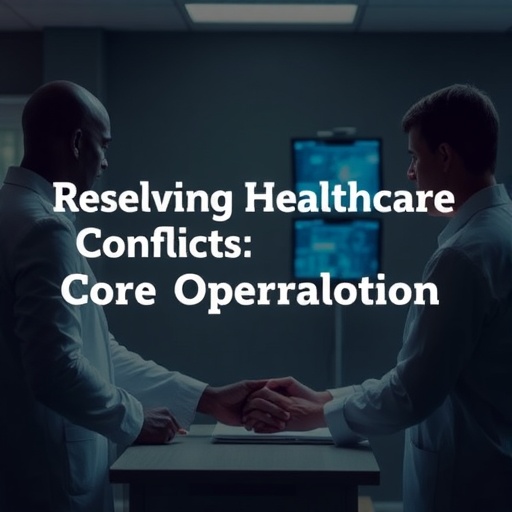In the evolving landscape of healthcare, the intricate dynamics between core operations and administrative functions have emerged as a focal point of interest among researchers and practitioners alike. A recently published study by Svensson takes a deep dive into this multifaceted relationship, examining the managerial responses that arise from the inherent conflicts and tensions that often characterize these interactions. The healthcare sector is notorious for its complex web of operations that necessitate seamless coordination between various stakeholders, making this inquiry particularly timely and relevant.
One of the most critical aspects of Svensson’s research lies in its exploration of the dichotomy between clinical and administrative priorities. Often, the core operations, which involve patient care and medical services, can clash with the administrative endeavors focused on policies, budgeting, and compliance. This friction is not merely a theoretical concern but a practical challenge that can have far-reaching implications for the efficacy of healthcare delivery. By identifying and analyzing these conflicts, the study offers valuable insights into effective managerial strategies that can bridge the gap between these two essential components.
The tension is further exacerbated by the increasing pressures faced by healthcare organizations, including budget constraints, regulatory requirements, and the urgent need to improve patient outcomes. In this context, managers must navigate a delicate balancing act, ensuring that administrative goals do not overshadow the primary mission of delivering high-quality care. Svensson’s examination reveals that successful managerial responses necessitate not only an understanding of the operational realities but also a strategic vision that intertwines clinical objectives with administrative imperatives.
A noteworthy finding from the research is the significance of communication in alleviating conflicts. Svensson highlights that transparent dialogue between clinical and administrative teams can foster a collaborative environment where mutual respect and understanding flourish. This approach not only mitigates tensions but also cultivates a culture of shared goals and collective accountability. Therefore, the role of effective communication cannot be overstated; it is the linchpin that holds various components of healthcare organizations together.
Moreover, the study indicates that managerial responses should not be reactive but rather proactive. By anticipating potential conflicts and addressing them through strategic planning and intervention, healthcare leaders can set the stage for a more harmonious operational environment. Svensson’s insights point towards a shift in managerial mindset—moving from a combative stance to one that embraces collaboration and partnership between clinical and administrative factions. This transformation is essential for fostering innovation and adaptability in a sector that is continually evolving.
An intriguing aspect of this research lies in its emphasis on the significance of leadership styles in managing conflicts. Svensson categorizes different leadership approaches and their subsequent effects on organizational dynamics. For instance, transformational leaders who inspire and motivate their teams can effectively bridge the ideological divide between core operations and administration. In contrast, a transactional leadership style may reinforce silos and deepen conflicts, ultimately detracting from the overarching mission of the healthcare organization.
In addition to leadership style, the study underscores the role of organizational culture in shaping managerial responses to conflicts. A culture that prioritizes flexibility, inclusivity, and shared decision-making appears to be more effective in managing tensions. Svensson argues that cultivating such a culture is a long-term commitment that requires consistent effort and dedication from all levels of the organization. This cultural transformation not only enhances conflict resolution mechanisms but also positively impacts employee engagement and retention.
The implications of Svensson’s findings extend beyond theoretical frameworks; they carry practical applications that healthcare organizations can implement immediately. Training programs focused on enhancing communication skills, conflict resolution, and leadership effectiveness can empower managers at all levels to address tensions with confidence. Additionally, promoting interdisciplinary collaboration through joint meetings and projects can help dismantle barriers that often separate clinical and administrative teams.
As healthcare continues to grapple with the challenges presented by increasing patient demands and evolving regulations, the insights garnered from this study are likely to resonate with decision-makers seeking to refine their management practices. Svensson’s work acts as a clarion call for leaders in the sector to reassess their strategies for overcoming conflicts, fostering an environment that encourages collaboration rather than division.
Finally, one cannot overlook the relevance of this research in light of global health crises, such as pandemics, which have amplified the need for efficient coordination between clinical and administrative functions. Such crises demand rapid responses that require flawless communication and collaboration among all stakeholders. Thus, understanding and addressing the conflicts that arise within healthcare organizations is not just a matter of organizational efficiency; it is a necessity for safeguarding public health.
In conclusion, Svensson’s exploration of managerial responses to the conflicts between core operations and administration in healthcare is a vital contribution to our understanding of organizational dynamics. By shining a light on the importance of effective communication, proactive conflict management, and transformative leadership, this research offers a roadmap for healthcare leaders striving to create a more cohesive and resilient operational framework. As the industry continues to evolve, embracing these insights will be crucial for navigating the complexities of healthcare delivery and ensuring the best outcomes for patients.
Subject of Research: Managerial responses to conflicts and tensions between core operations and administration in healthcare.
Article Title: Taking sides or bridging worlds? Managerial responses to conflicts and tensions between the core operations and the administration in healthcare.
Article References: Svensson, I. Taking sides or bridging worlds? Managerial responses to conflicts and tensions between the core operations and the administration in healthcare. BMC Health Serv Res 25, 1453 (2025). https://doi.org/10.1186/s12913-025-13659-9
Image Credits: AI Generated
DOI: https://doi.org/10.1186/s12913-025-13659-9
Keywords: Managerial responses, healthcare operations, administrative conflicts, communication, leadership, organizational culture, collaboration.




